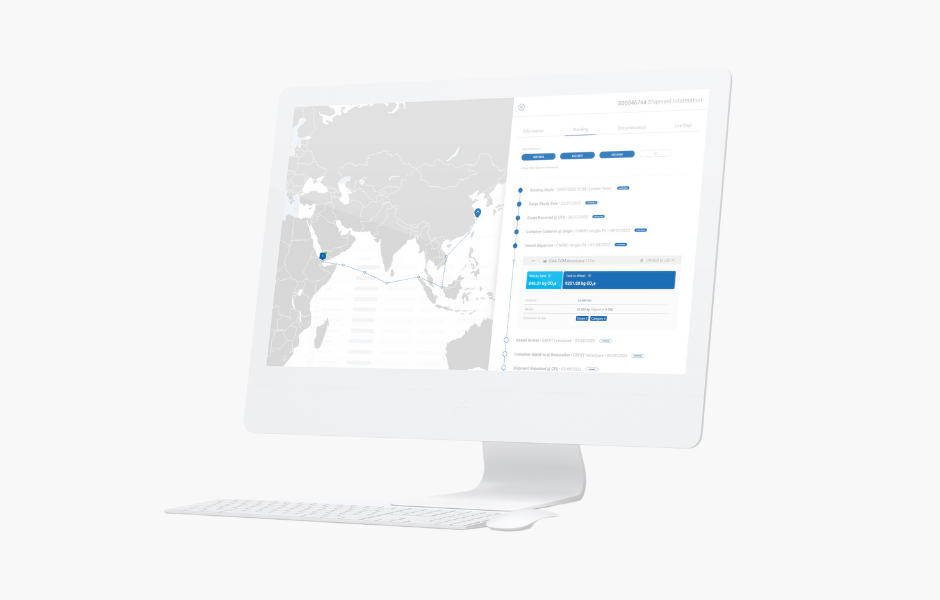.png)
.png)
.png)


At the beginning of this year, we set out to improve how we manage our clients’ supply chains; we knew it wouldn’t be a quick project. Modern global trade is complex, and every business has its own unique challenges. Over the past few years, our team at Unsworth has been on an incredible journey of innovation, working hand-in-hand with our clients across industries like food and drink, publishing, and retail to build something that truly makes a difference: Pathway Order and Product Management.
When we started, the problem was clear. Many of our clients were grappling with fragmented systems and manual processes. Orders were managed in one place, bookings in another, and exception handling often lived in email threads or spreadsheets.
For a food and drink client, this meant constant pressure to keep perishable goods moving on time. A single missed update could mean wasted stock or lost revenue. For a publishing partner, delays meant missed print windows and book launches—timing was everything. For retailers, the challenge was scale. Hundreds of orders from multiple suppliers, all moving towards different deadlines, created a level of complexity that human teams couldn’t manage efficiently without technology doing the heavy lifting.
We realised that visibility alone wasn’t enough. Our clients didn’t just want to see their supply chains—they wanted to control them, anticipate problems, and collaborate seamlessly across all stakeholders.
We didn’t want to build a platform in isolation. Instead, we partnered with our clients to co-develop features that solved real-world pain points. We spent time in their warehouses, on their calls with suppliers, and in their planning meetings. We listened to the frustrations—missed approvals, last-minute booking changes, mismatched data between systems—and we saw opportunities to make a genuine impact.
Our first breakthrough came with automation and exception management. We built Pathway’s ability to capture order changes instantly and flag them to the right people. No more waiting for an email to be noticed or a spreadsheet to be updated. When a shipment date moved or a quantity changed, the system pushed the update to all stakeholders immediately.
This was a turning point for one of our food and drink partners, where freshness is everything. Previously, a delay notification might take hours to circulate internally, risking stock arriving too late for distribution. With Pathway in place, that notification became instant and actionable, saving both time and product.
As we evolved the platform, we focused on integration and flexibility.
Every client had a different tech setup, from ERP systems to order management tools, and we knew rigid integrations would slow them down.
That’s where the customisable client feed was born. We made Pathway capable of handling CSV, XML, and even PDF inputs, letting clients plug in their data without a lengthy IT project.
This flexible approach also allowed real-time communication with CargoWise, streamlining bookings, approvals, and even cancellations. By removing manual double-entry, our clients could trust their data, avoid costly errors, and focus on running their supply chains—not chasing information.
· See every product and booking in one place, from production to final delivery.
· Collaborate across teams—from suppliers and agents to internal operations—directly in the platform.
· Act on issues before they become problems, with proactive exception alerts and milestone tracking.
One of our retail clients described it perfectly:
“Before Pathway, we were reacting to problems. Now, we see them coming and solve them before they hit our customers.”
That’s the shift we wanted to create—from reactive firefighting to proactive control.
One of the most exciting challenges we tackled was critical path management.
Traditional supply chain tools often provide a static plan, but in the real world, plans change—suppliers miss deadlines, production slips, vessels are delayed. A single shift can throw an entire schedule off track.
We wanted our clients to have more than just a timeline; we wanted to give them a living, breathing roadmap that adapts in real time.
· Build custom critical paths for each shipment or product line, based on their exact operational needs.
· Tweak and recalculate those paths on the fly when a date changes or an exception arises.
· Instantly see the downstream impact of any change, so the right teams can take action immediately.
For our food and drink clients, this means adjusting production and shipping schedules dynamically to protect shelf life. For publishing clients, it ensures book releases stay aligned with marketing campaigns, even when printers or vessels are delayed. And for retailers, it provides the confidence to promise accurate delivery dates in a volatile market.
In short, critical pathing has turned Pathway from a visibility platform into a decision-making engine, giving our clients the power to plan, adapt, and stay ahead.
This journey has been as much about partnership as technology.
Our clients trusted us to experiment, iterate, and build something that truly solved their problems. In return, we gained deep insight into the realities of modern supply chains: time-sensitive shipments, fluctuating schedules, fragmented data, and the rising demand for end-to-end transparency.
Through this collaboration, Pathway Order and Product Management has become more than a platform—it’s a shared solution to the industry’s most pressing challenges. It represents our commitment to helping our clients thrive in a world where supply chains can make or break customer experiences.
As we look ahead, our mission remains clear: To keep innovating, keep collaborating, and keep delivering tools that make supply chains smarter, faster, and more resilient.
Because at Unsworth, we know one thing for certain: When our clients have complete control and visibility, their supply chains stop being a challenge—and start being a competitive advantage
.png)
.png)
.png)